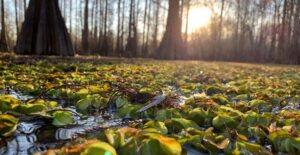By Matt Ward
First, let me say that we sincerely hope that all of you are OK after last week’s extreme winter weather. Our thoughts are truly with those who experienced the worst of the power and water outages. If you were among this group we hope that you are on the road to recovery this week.
I have to say it was heartening to see so many coming together to help each other out during the big freeze.
On a related note, we have received a good number of questions from our clients about the effect of cold on ponds and lakes so we hope this brief summary helps to answer most of your questions.
Please drop us a line if you have any other specific concerns or questions we can answer around fishery management or pond management in general.
What about the fish?
As most of you know, fish are cold-blooded (“ectotherms” would be a more scientifically correct term for the science nerds).
This means that during our unusually cold weather, fish body temperatures mirrored the lake temps and as such fish metabolisms slowed to a crawl. In general, most of the fish that live in our waters are accustomed to short periods of cool weather and will have fared the weather just fine.
That being said, there are a few fish that are a bit more cold-sensitive so we do want to keep an eye out for these fish and note any losses.
Threadfin shad
The most cold-sensitive fish we have in our lakes are threadfin shad. Threadfin generally experience at least partial die-offs when water temperatures dip below 45 degrees Fahrenheit.
On top of this, threadfin shad get highly lethargic and even the fish that would have survived the cold will generally get swallowed up by largemouth bass which are much less affected by the low water temps.
With last week’s cold front, we expect that we lost most or all of the threadfin shad in most every small impoundment in the state.
We’ll be monitoring populations in lakes with large amounts of shad, but we don’t expect to find shad left over. Threadfin shad availability will also likely be down this year, so expect supplies to be short as well.
If you want to restock the fish, get your orders in early and know that demand should outstrip supply.
Florida Bass
While far more cold-hearty than threadfin shad, Florida bass are famously more susceptible to cold than their northern counterparts. While cold weather can kill off Florida bass, fishery managers stock Florida bass successfully well north of the Red River.
Losses in Texas should be minor though the farther north you are, the more attention you should pay to your Florida largemouth bass stock. Northern largemouth bass are fully adapted to cold water like we experienced last week, but certain populations like feed-trained bass can be a bit more susceptible to rapidly cooling water temps.
While we expect that threadfin shad are the primary victim of last week’s arctic blast, an electrofishing survey is the best way check for any other significant impacts.
Predators get active during cold
Fish instincts do generally cause fish to go deep during cold weather, providing a small degree of protection from predators. But cold weather also increases the metabolisms of both otters and birds who need to eat more to keep warm.
While your fish may survive the cold just fine, predator consumption will rise and fish losses from predation should be expected. Do what you can to minimize loss, but look for changes in catch rates and be prepared to stock.
Vegetation takes a hit
The one really bright side of last week’s weather is that the cold-snap should provide a welcome reprieve from undesirable early season growth of pond weeds.
Cold water temperatures have likely pushed the growing season back several weeks allowing for a thorough winter kill and forcing pond weeds to grow again from seeds and roots.
Note that marginal vegetation will likely have turned completely brown. But have faith. Most native vegetation is built to survive this kind of weather event and growth will return once temperatures warm. While browned-out growth can be removed for aesthetic purposes, know that removal will likely slow recovery.
Forage fish lose cover
Whenever we lose submersed vegetation, forage fish often lose a majority of their preferred cover.
This cover loss can enable bass to depress forage populations which may not recover for several months or until supplemental stockings are deployed.
These kinds of situations really demonstrate the value of non-living cover which provides stable cover regardless of winter vegetation die-back.
The best way to monitor the impact from winter forage loss is to monitor bass health as the weather warms. If bass remain fat and healthy forage loss is likely not a concern, while thin bass indicate a lack of the same. While all gamefish benefit from robust forage populations, do note that pelleted feed-based fisheries need not be concerned about temporary forage fish depressions as gamefish rely primarily on fish food.
Keep an eye on your fishery
All in all, cold weather certainly impacts fisheries in significant ways. These impacts are generally specific to each fishery and difficult to predict across the board. In general predation will have increased and forage fish populations will have fallen. To keep your fishery developing appropriately you should monitor the fishery and make needed adjustments in a timely manner to keep your fishery developing appropriately.
Why Choose Lochow Ranch for Pond & Lake Management
Serving Texas, Oklahoma, Arkansas and Louisiana, Lochow Ranch Pond & Lake Management proudly puts more than two decades of experience to work for you. Our team includes biologists, technicians and other professionals with deep expertise in pond and lake management services.
Check us out if you are considering building a lake, looking for pond stocking services, to buy fish for a pond, or getting professional pond management and maintenance or fishery management. Our services include lake design, pond construction, pond renovation, pond water testing, electrofishing, pond stocking, control of pond weeds, and pond liming and fertilizing. Let us help you build your dream pond that will delight your family and friends for generations to come.
Click here to get in touch to get started today.
Matt Ward is a Fishery Biologist for Lochow Ranch Pond & Lake Management. He has a Master of Science in Biochemistry from Texas A&M University and has worked in fisheries management in Texas for 15 years. He brings a passion for good science and an interdisciplinary approach to the natural sciences to help property managers steward their aquatic resources and achieve management objetives.


Recent Comments